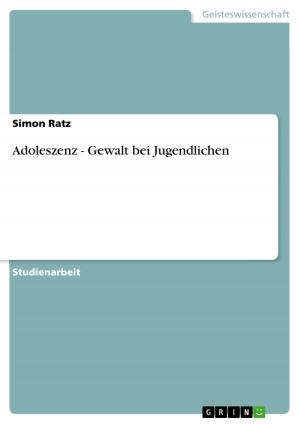The OSCE system: Institutional design and conflict management in the 21st century
Nonfiction, Social & Cultural Studies, Political Science, International, International Relations| Author: | Harald Löberbauer | ISBN: | 9783638689830 |
| Publisher: | GRIN Verlag | Publication: | March 9, 2012 |
| Imprint: | GRIN Verlag | Language: | English |
| Author: | Harald Löberbauer |
| ISBN: | 9783638689830 |
| Publisher: | GRIN Verlag |
| Publication: | March 9, 2012 |
| Imprint: | GRIN Verlag |
| Language: | English |
Research Paper (undergraduate) from the year 2006 in the subject Politics - International Politics - Topic: International Organisations, grade: 1 (A), Diplomatic Academy of Vienna - School of International Studies, course: NATO and the Politics of Trans-Atlantic Relations, 80 entries in the bibliography, language: English, abstract: The OSCE is an international organization, which acts on a regional security level. It is the largest regional security organization in the world with 56 participating member states and is integrating the geographical area of Eurasia and North America. The object of research is to find out how the organization is designed, how it functions in conflict management and what future perspectives of the OSCE look like. This research is basically divided into two parts (III The OSCE as an international organization and IV The OSCE in the 21st century). After defining the most important terms for this paper, the first part of the research will analyze the institutional design, the structure and the historic development of the OSCE with the aim to go into detail into conflict management mechanisms. Case studies of missions of the OSCE are involved in the research but they are mentioned to supplement the empiric analysis of conflict management of the OSCE. The second part of the analysis should give a future perspective for the OSCE. The OSCE in the 21st century would be completely different from the OSCE of the 1970s. Therefore in this part the focus is set on an analysis according to international relations theory and international law to show what the differences between the OSCE of the Cold War and the OSCE after 9/11 are. Strength and limitations of the OSCE are shown in order to describe reform recommendations and future perspectives of the organization from a political scientist and international lawyer point of view.
Research Paper (undergraduate) from the year 2006 in the subject Politics - International Politics - Topic: International Organisations, grade: 1 (A), Diplomatic Academy of Vienna - School of International Studies, course: NATO and the Politics of Trans-Atlantic Relations, 80 entries in the bibliography, language: English, abstract: The OSCE is an international organization, which acts on a regional security level. It is the largest regional security organization in the world with 56 participating member states and is integrating the geographical area of Eurasia and North America. The object of research is to find out how the organization is designed, how it functions in conflict management and what future perspectives of the OSCE look like. This research is basically divided into two parts (III The OSCE as an international organization and IV The OSCE in the 21st century). After defining the most important terms for this paper, the first part of the research will analyze the institutional design, the structure and the historic development of the OSCE with the aim to go into detail into conflict management mechanisms. Case studies of missions of the OSCE are involved in the research but they are mentioned to supplement the empiric analysis of conflict management of the OSCE. The second part of the analysis should give a future perspective for the OSCE. The OSCE in the 21st century would be completely different from the OSCE of the 1970s. Therefore in this part the focus is set on an analysis according to international relations theory and international law to show what the differences between the OSCE of the Cold War and the OSCE after 9/11 are. Strength and limitations of the OSCE are shown in order to describe reform recommendations and future perspectives of the organization from a political scientist and international lawyer point of view.















